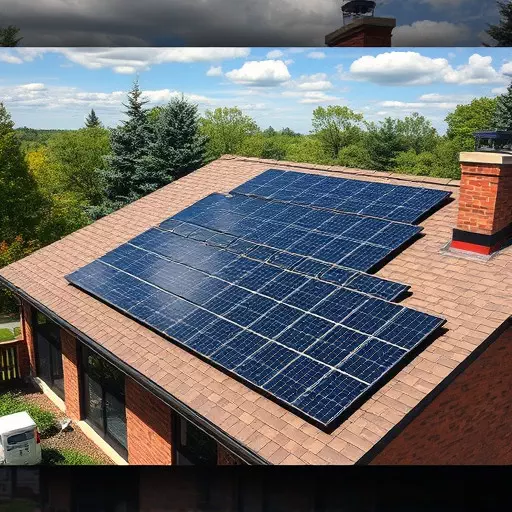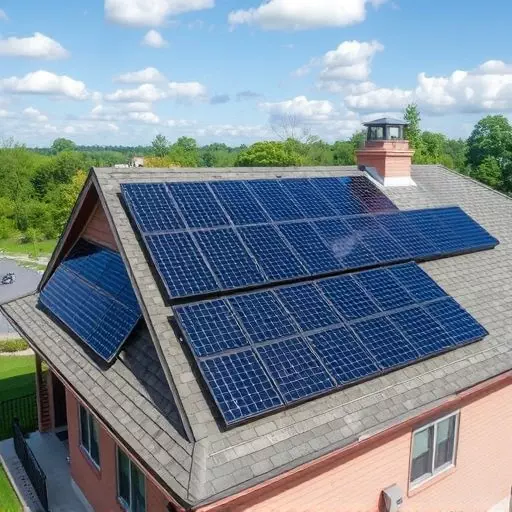Solar roofing systems in Appleton, Wisconsin, powered by photovoltaic (PV) panels, are gaining popularity due to favorable climate conditions. These systems reduce energy costs and carbon footprints while advanced energy storage technologies ensure a stable power supply. Key storage solutions include lithium-ion batteries, flow batteries, and compressed air energy storage (CAES). Integrating these systems with smart grids and microgrids enhances grid stability, promotes sustainability, and reduces reliance on fossil fuels. Local incentives and community initiatives further drive the adoption of solar roofing systems as Appleton strives for a greener future.
Energy storage systems are revolutionizing modern energy networks, enabling more sustainable and efficient power management. From bustling cities like Appleton, Wisconsin, where solar roofing systems harness the sun’s potential, to innovative technologies like photovoltaic panels, these systems are transforming how we consume and store energy. This article explores various aspects of energy storage—its role in today’s networks, different types, benefits, and future integration—with a focus on solar roofing systems and photovoltaic panels as key components in a greener energy landscape.
- Understanding Energy Storage Systems: The Role in Modern Energy Networks
- Solar Roofing Systems Appleton Wisconsin: Harnessing Sunlight for Sustainable Energy
- Photovoltaic Panels: Unlocking the Potential of Solar Power
- Types and Technologies of Energy Storage Solutions
- Benefits and Applications of Energy Storage Systems
- Integrating Energy Storage: A Roadmap for a Greener Future
Understanding Energy Storage Systems: The Role in Modern Energy Networks
Energy storage systems play a pivotal role in modern energy networks, especially with the increasing integration of renewable sources like solar roofing systems in Appleton, Wisconsin. As more households and businesses adopt solar roofing systems equipped with photovoltaic (PV) panels, the need for efficient energy storage becomes paramount. These systems address the intermittent nature of renewable energy production by storing excess electricity generated during periods of high sunlight for later use, ensuring a stable and reliable power supply throughout the day.
The integration of energy storage solutions, such as advanced batteries or pumped hydro storage, allows for better management of energy demand and supply dynamics. This is particularly crucial during peak hours when energy consumption soars or when there’s a discrepancy between solar energy generation and immediate demand. By storing excess energy, these systems enable grid stability, reduce reliance on fossil fuels, and contribute to a more sustainable and cost-effective energy infrastructure, enhancing the overall efficiency of solar roofing systems in Appleton, Wisconsin, and similar locations.
Solar Roofing Systems Appleton Wisconsin: Harnessing Sunlight for Sustainable Energy
In Appleton, Wisconsin, homeowners are increasingly turning to solar roofing systems as a means of harnessing the power of sunlight for sustainable energy. These cutting-edge solutions integrate photovoltaic (PV) panels directly into traditional roofing materials, offering both aesthetic appeal and significant energy savings. By converting sunlight into electricity, these solar roofing systems contribute to reduced carbon footprints and long-term cost savings.
Appleton’s favorable climate makes it an ideal location for solar energy adoption. The region receives ample sunlight throughout the year, enhancing the efficiency of PV panels. Moreover, local incentives and rebates make the installation of solar roofing systems more accessible and affordable for residents. This shift towards renewable energy not only benefits individual homeowners but also contributes to a broader goal of creating a greener, more sustainable future for the community as a whole.
Photovoltaic Panels: Unlocking the Potential of Solar Power
In Appleton, Wisconsin, and beyond, solar roofing systems are transforming the way we harness clean energy. At their core, photovoltaic (PV) panels play a pivotal role in unlocking the immense potential of solar power. These cutting-edge technologies convert sunlight directly into electricity through a process that’s both efficient and sustainable. By integrating PV panels into residential, commercial, and industrial structures, communities like Appleton are taking significant steps towards energy independence and reducing their carbon footprint.
The advantages of photovoltaic panels extend far beyond environmental benefits. Solar roofing systems offer cost-effective solutions for energy storage, allowing excess electricity generated during sunny periods to be saved for later use. This not only ensures a reliable power supply but also translates into substantial long-term savings for property owners. With advancements in technology and increasing support from local initiatives, the adoption of solar roofing systems is more accessible and attractive than ever before, making Appleton a shining example of a sustainable future powered by the sun.
Types and Technologies of Energy Storage Solutions
Energy storage systems play a pivotal role in the transition to renewable energy sources, especially with the widespread adoption of solar roofing systems in Appleton, Wisconsin and beyond. These technologies are crucial for harnessing the intermittent nature of solar power, where photovoltaic (PV) panels generate electricity based on sunlight availability. To address this variability, various types of energy storage solutions have emerged.
Among them, lithium-ion batteries dominate the market due to their high energy density and versatility. They can be integrated into residential, commercial, and utility-scale projects. Another promising technology is flow batteries, which store energy in liquid electrolytes, offering longer cycles and potential for larger-scale applications. Additionally, compressed air energy storage (CAES) systems capture excess energy during low demand periods by compressing air and release it when electricity is needed, with the advantage of being scalable and cost-effective. These diverse options cater to different needs, from residential solar roofing systems in Appleton, Wisconsin to large-grid stability projects.
Benefits and Applications of Energy Storage Systems
Energy storage systems offer a multitude of benefits for both residential and commercial applications, especially in regions with abundant solar energy, like Appleton, Wisconsin. For homeowners with solar roofing systems equipped with photovoltaic (PV) panels, energy storage provides a way to capture and store excess energy produced during peak sunlight hours for use later when sun is scarce or at night. This ensures that residents can maximize their reliance on clean, renewable energy sources, reducing electricity bills and carbon footprints.
In the context of solar roofing systems Appleton Wisconsin installations, these storage systems serve as a bridge between the intermittent nature of solar power generation and consistent energy demand. They allow businesses and industries to stabilize their operations by storing excess energy generated during off-peak times for use during periods of high demand or when grid power is unstable. This enhances overall system efficiency, contributes to a more reliable power supply, and reinforces the sustainability of renewable energy adoption in the region.
Integrating Energy Storage: A Roadmap for a Greener Future
Integrating energy storage systems is a pivotal step toward a greener future for Appleton, Wisconsin, and beyond. By combining solar roofing systems equipped with photovoltaic (PV) panels and advanced energy storage technologies, communities can unlock significant environmental and economic benefits. This roadmap involves several key strategies. First, adopting smart grid infrastructure enables seamless integration of renewable energy sources, allowing for more efficient power distribution and management. Second, integrating battery storage solutions into residential, commercial, and industrial settings facilitates the capture and utilization of excess solar energy during peak production times.
Additionally, the implementation of microgrid systems can enhance local resilience and independence by isolating energy generation and consumption within a defined geographic area. This not only reduces reliance on traditional utility grids but also ensures a steady supply of clean energy during outages or grid fluctuations. As Appleton continues to embrace sustainable practices, leveraging solar roofing systems and complementary energy storage technologies will play a pivotal role in achieving climate goals, mitigating environmental impact, and fostering a more resilient and eco-conscious community.


